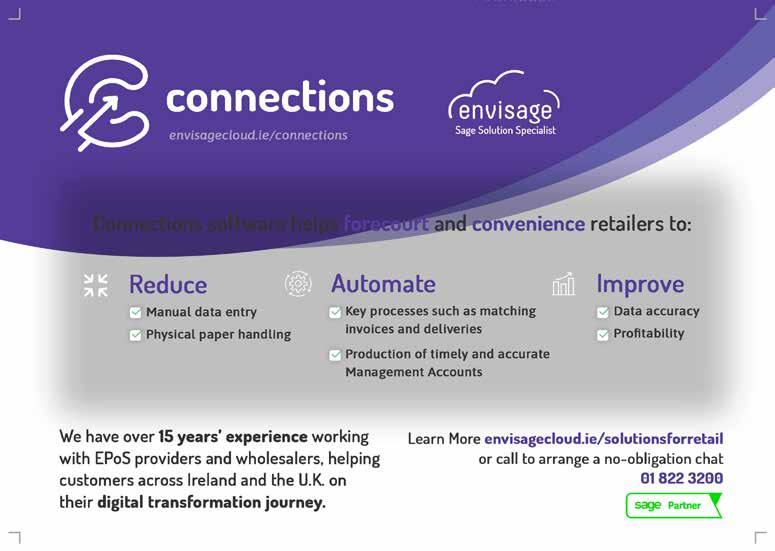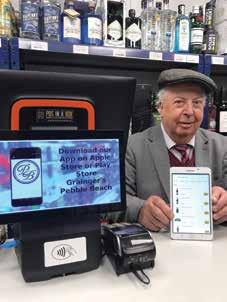
10 minute read
Morgan Stokes examines how you can help your team improve their digital skills, while we also report on how Envisage’s Connections software helps retailers transform their administrative processes, and explain how the POSInABox mobile app from FirstChoice ePOS can boost sales
Digital Solutions: The Skills for Success
Digital skills for success: training to boost your business
Though Ireland fares among the best in the EU for the digital skills of its population, the general level of knowledge is less than one might think, with 42% of Irish adults rating their skills as below average. Morgan Stokes examines the reasons behind the figure and the ways that you can help your team improve in this area.
THOUGH Irish retailers have been increasingly forced to carry out their business online since we first locked down over a year ago, the FMCG sector has largely been able to keep its doors open and do the heroic work of feeding the country in a once-in-a-century crisis. But there’s no doubt that consumer behaviour has changed – customers are increasingly looking for online delivery options and searching for special offers on social media. The pace of automation and technological innovation had already been accelerating well before Covid-19, with a Retail Ireland Skillnet report from early 2020 finding that some 36% of store owners planned to make significant improvements across internal systems such as self-checkouts and hand-held terminals, eCommerce and online sales, and ‘digital footprint’, which includes social media and web presence. However, that same report found that 31% of store owners were reluctant to make such improvements due to lack of skills in their organisations. The start of the pandemic saw an explosion in online seminars from retail groups and from the Irish government, aimed at boosting the digital skills of the grocery sector. However, employers may need to assume a lower baseline of familiarity with technology among their staff than they might initially suppose. “We know that across the EU there is an average of 55-60% of people who have at least a basic level of digital skills,” says Mary Cleary, Chair of the Irish Computer Society, which runs the Irish Digital Skills and Jobs Coalition. “In Ireland, we’re doing a bit better, but only by two or three percentage points”. In other words, if you (or your employees) have difficulty figuring out your smartphone or sending emails, you are not alone.
An issue among all age groups
When you think of an employee struggling with technology at work, you may immediately picture somebody close to retirement. While age remains the best predictor of a lower digital skill level, ‘Bridging the Gap - Ireland’s Digital Divide’, a 2020 report from Accenture, found that one in five adults in the 18-34 age bracket rated their digital skills as below average (compared to 42% overall). Those who did were far more likely to be working in lower income professions or have grown up with parents who did – it’s easy to forget that while owning a computer and smartphone is seen as a necessity now, it was still a luxury 15 years ago. Younger people may be more likely to feel ashamed of not being able to use the technology they need to do their jobs and might avoid it wherever possible, not an ideal outcome if you’ve been investing in store systems to improve efficiency. Employees with lower digital skills in general might also avoid using new systems out of fear that they might break them. Cleary cautions against the assumption that all young people are intuitively good with technology. “There may be a misconception that all children are digital natives now, but that is a misconception. They’re able to respond to a touchscreen… but in terms of using technology and developing real digital skills, they need to be taught that.” Being adept with technology in your personal life does not necessarily immediately translate to the workplace, either; an employee with a stellar private Instagram following could seem like the ideal person to take charge of your small business’ social media account, but while they might be a better choice than
Digital Solutions: The Skills for Success

Equipping your staff with digital skills can have huge benefits for your business.
someone who grudgingly uses Facebook to wish their friends a happy birthday, they won’t necessarily have the skills to break down social media statistics and decide what content is best to put out on a business-to-consumer account.
Help is out there
Thankfully, there is a lot of training out there that exists to move adult learners from barely surviving to thriving in the digital landscape. ICDL, or the International Computer Driving License, remains a gold-standard programme for adult digital literacy. If you hail from a certain era, you might remember sitting in school in front of a bank of dusty CRT monitors to memorise Excel formulas for your European Computer Driving License, but the certification has moved on leaps and bounds since then. The course now contains 31 discreet modules covering everything from back-office tasks to social media, with a new module on online sales and eCommerce in development, and is run through the Irish Computer Society. The ICDL Digital Citizen course is aimed at very beginners, with a focus on removing a fear of technology. For more information see icdl.ie. Supporting Communities, an Irish government funded initiative, runs a series of online seminars covering basic digital skills, online safety and social media. The courses are broken down into individual modules, so there’s no need to sit through anything that you already know, and there are lessons on how to get more out of Facebook and other tools that you or your employees are probably already using. The Retail Ireland Skillnet runs a host of training options, covering all aspects of retailing (including digital marketing) from shorter e-learning courses to a two-year Apprenticeship in Retail Supervision and right up to BA and MA level. See retailirelandskillnet.com for more information. You could also consider paying a private company to conduct training organisation-wide. While some more technologically adept employees may consider such training a waste of their time, you might be reaching a crucial few who were afraid to put their hand up.
Consider outsourcing
IT is a broad field and no one person can be great at everything – just ask any software engineer who has had to patiently explain, for the fifth time, that they don’t know how to fix their aunt’s internet connection. While most small business owners might be aware that you can hire companies to design websites and maintain internal systems, many aren’t aware you can also outsource your social media presence and eCommerce needs.
Technology in retail
FROM high-end EPOS solutions to self-scanning checkouts, technology continues to impact on the retail sector, both in the back-office and the way the consumer shops the store. Most consumers now do their product research online, for example, either on their computers, tablets or, most frequently, on the smartphone in their hand, even when it comes to reasonably small purchases. Increased automation, more effective use of big data and new tech like AI and extended reality are all having an impact on how people shop and how retailers interact with shoppers. M&S in the UK introduced in-queue checkouts in late 2020, whereby a staff member with a handheld device can take contactless payment for a small numbers of items. Meanwhile, eCommerce giants like Alibaba and Amazon are opening physical stores that blur the lines between online and bricks-and-mortar. While the shop assistant doesn’t necessarily have to understand the science behind the new technology, having tech-friendly staff can help to give your store the edge.

The pace of automation and technological innovation had already been accelerating well before Covid-19.

Digital Solutions: Software
IRISH software company Envisage,
IRISH software company Envisage, Ireland’s largest Sage partner and part of The Noledge Group, has been helping retailers improve administrative efficiencies for over 20 years. Envisage’s Managing Director, Ray Ryan talks about Connections, a unique retail solution used by over 440 convenience stores and forecourts across Ireland and the UK.
Making business easy with Connections
Connections helps retailers transform their administrative processes by replacing time-consuming manual tasks with efficient, automated processes. Retailers can easily get clear, concise and accurate information, in real-time. “In an average convenience store, there may be 20,000 line items; our Retail Connect module takes the sales and cash transactions from the EPOS system, validates, maps and posts them into Sage software in a few clicks,” Ray explains. “Supplier Connect automatches deliveries to supplier invoices and creates electronic queries, leaving only the exceptions to be managed manually. With our Scan Connect module, paperwork can be virtually eliminated. The result is an organised, efficient system with accurate reports available when you need them.”
Reimagining retail with Connections

Working with key convenience and EPOS operators
Envisage works with key convenience store wholesalers in both Ireland and

Ray Ryan, Managing Director, Envisage.
the UK, including Musgrave, BWG, James Hall, Nisa and Morrisons, as well as EPOS providers such as CBE and Hendersons. With average savings of 10 hours per week and a 50% reduction in paperwork, Connections has a vital role to play as convenience stores and forecourts look to technology to increase productivity and profitability. To find out more or book a demo with the Envisage team, contact Ray Ryan (01) 8223200 or email sales@envisagecloud.ie.


Digital Solutions: EPOS Your FirstChoice for EPOS
RENOWNED publican Hugh Grainger has used the POSInABox mobile app from FirstChoice ePOS to boost sales in the off licence at The Pebble Beach, Clontarf, Dublin 3. In fact, it has revolutionised how the off licence interacts with and targets its customers. “The POSInABox solution, with our own branded app, has enabled us to successfully launch our new Off Licence and delivery service,” Hugh explains. “We selected the POSInABox solution, provided by First Choice ePOS as they have been our EPOS provider in the bar for a long time, and we have always been satisfied with the high quality of their products, services and reliable customer support. The POSInABox system in itself is great; however, it’s The Pebble Beach branded app and online ordering which have really enabled us to increase customer spend.”
Seamless order fulfilment
The app, branded with the name of the bar and off licence, has been the real winner, as Hugh explains: “The branded app allows our customers to order and pay securely, and being fully integrated into our POS system, allows for seamless order fulfilment. We own the app, so we have full access and control of our customer database, which allows us to issue push notifications and make changes to special offers, pricing and products easily. We don’t pay any commission charges on orders, and the POSInABox solution is very affordable with the monthly software as a service option.” Customer feedback has been “hugely positive”, according to Hugh: “They love the convenience of the app, being able to order and pay for delivery or collection and track the status of their order. The POSInABox solution has put us in control and revolutionised how we reach our customers.” Find out more about what POSInABox can do for your business at www.POSInABox.ie.


The branded app and online ordering system allows customers to order and pay securely, and is fully integrated into the POS system.


Take your business to the next level & increase your sales with your own BRANDED MOBILE APP 0% Commission Fees


GET 50% OFF FOR 3 MONTHS WHEN YOU MENTION THIS ADVERT!
01 6523082 WWW.POSINABOX.IE











